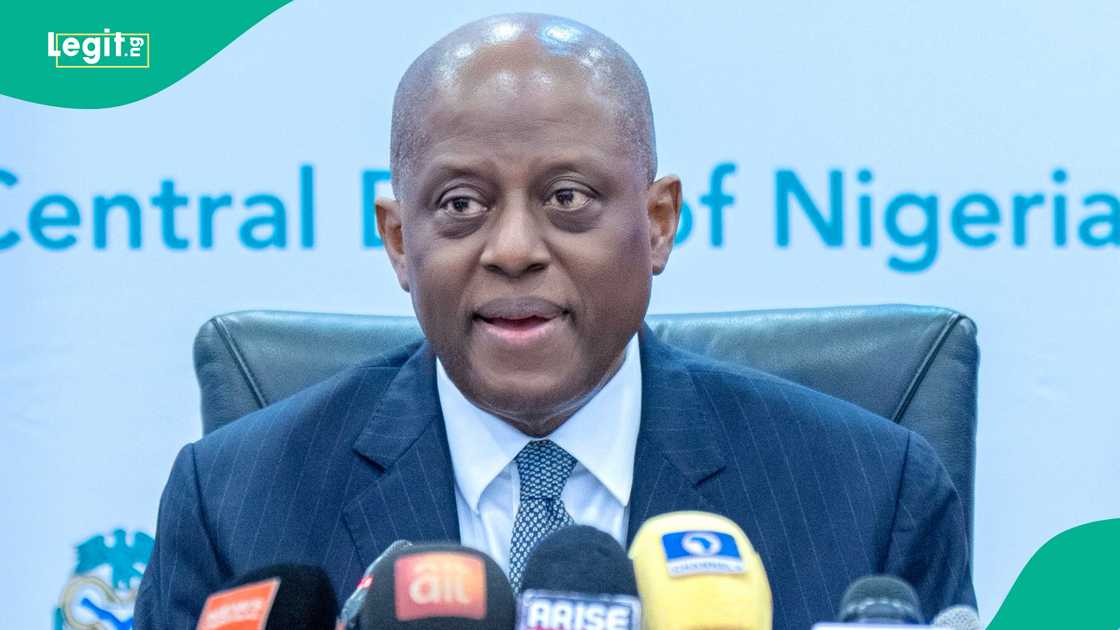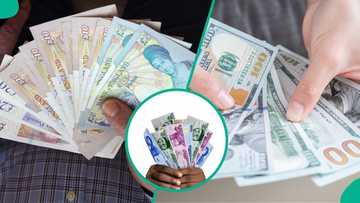Naira Gains Big with Stronger Reserves, Lower Import Costs, Fresh Confidence in Nigeria’s Economy
- The Nigerian currency, the naira, has remained stable, thanks to a raft of CBN policies and stronger external reserves
- Data from the Central Bank of Nigeria (CBN) indicates that the naira sustained a full week of gains
- Experts are predicting long-term appreciation for the local currency, driven by renewed investor confidence and reserves accretion
Pascal Oparada, a reporter for Legit.ng, has over ten years of experience covering technology, energy, stocks, investment, and the economy.
Nigeria’s currency, the naira, has sustained its strongest rally in months, trading around ₦1,487 per dollar at the official foreign exchange market.
Analysts credit the rebound to a mix of CBN reforms under Governor Olayemi Cardoso, growing foreign reserves, reduced speculative activity, and renewed investor trust.

Source: Getty Images
Official data showed the naira traded between ₦1,498/$ and ₦1,507/$ last week, compared to ₦1,526/$ at the start of September.
Reserves strengthen, confidence returns
The parallel market reflected the same trend, strengthening to ₦1,515–₦1,517/$.
For experts, this is more than a temporary recovery. If discipline holds, it could mark the foundation of a structurally stronger naira.
Foreign reserves have risen steadily, standing at $41.69 billion as of September 12, 2025. Net FX reserves—adjusted for near-term obligations—climbed to $23.11 billion, the highest in three years.
Analysts say these buffers, supported by improved oil inflows and better management of diaspora remittances, have reduced Nigeria’s vulnerability to external shocks.
“This rally is stronger than what we’ve seen in previous cycles,” noted Ifeanyi Ubah of Commercio Partners.
Relief for importers and households
The stronger naira is already easing import costs. Customs duties and taxes, tied directly to exchange rates, are gradually falling.
In 2024, Nigeria imported $40.97bn worth of goods, with China, Belgium, and India as leading partners.
In the first quarter of 2025, food and beverage imports alone hit ₦1.67 trillion, a 5% rise year-on-year.
With the currency stabilising, businesses expect lower import bills, relieving inflationary pressures and boosting consumer purchasing power.
GDP rebasing signals new opportunities
According to a report by Punch, the National Bureau of Statistics (NBS) recently rebased Nigeria’s GDP to capture emerging sectors like tech and entertainment. The economy’s nominal size now stands at ₦372.8 trillion, up from ₦205 trillion in 2019.
Economists say the rebasing not only gives investors a clearer picture but also strengthens policy direction.
“It helps channel resources more strategically, highlighting structural strengths and untapped opportunities,” economist Aliyu Ilias explained.
Policy discipline remains critical
Nigeria’s recent progress rests heavily on reforms—exchange rate unification, fuel subsidy removal, tighter fiscal controls, and transparency in reserve management.

Source: Twitter
These steps restored investor confidence and reopened international capital markets.
Yet risks remain. Economists caution that sustaining momentum will depend on macroeconomic discipline, steady oil production, and true export diversification beyond crude.
Naira: What’s next for households?
The naira’s rally reflects more than favourable numbers—it shows reforms are reshaping Nigeria’s economy. For businesses, it lowers costs and provides stability. For households, it hints at relief from rising prices.
And for the government, it offers breathing space to pursue deeper structural reforms.
In Governor Cardoso’s words: “We remain focused on transparency, discipline, and reforms that build resilience for the long term.”
CBN sells dollars to authorised dealers
Legit.ng earlier reported that CBN has intervened in the official foreign exchange market to boost liquidity and boost the naira’s value.
The financial sector regulator conducted foreign exchange interventions, selling $50 million to authorised banks on Tuesday, May 27, 2025, at N1,581 and N1,581.92.
The latest interventions came after the apex bank sold $190 million to the FX market last week, which experts say has fizzled away.
Source: Legit.ng




